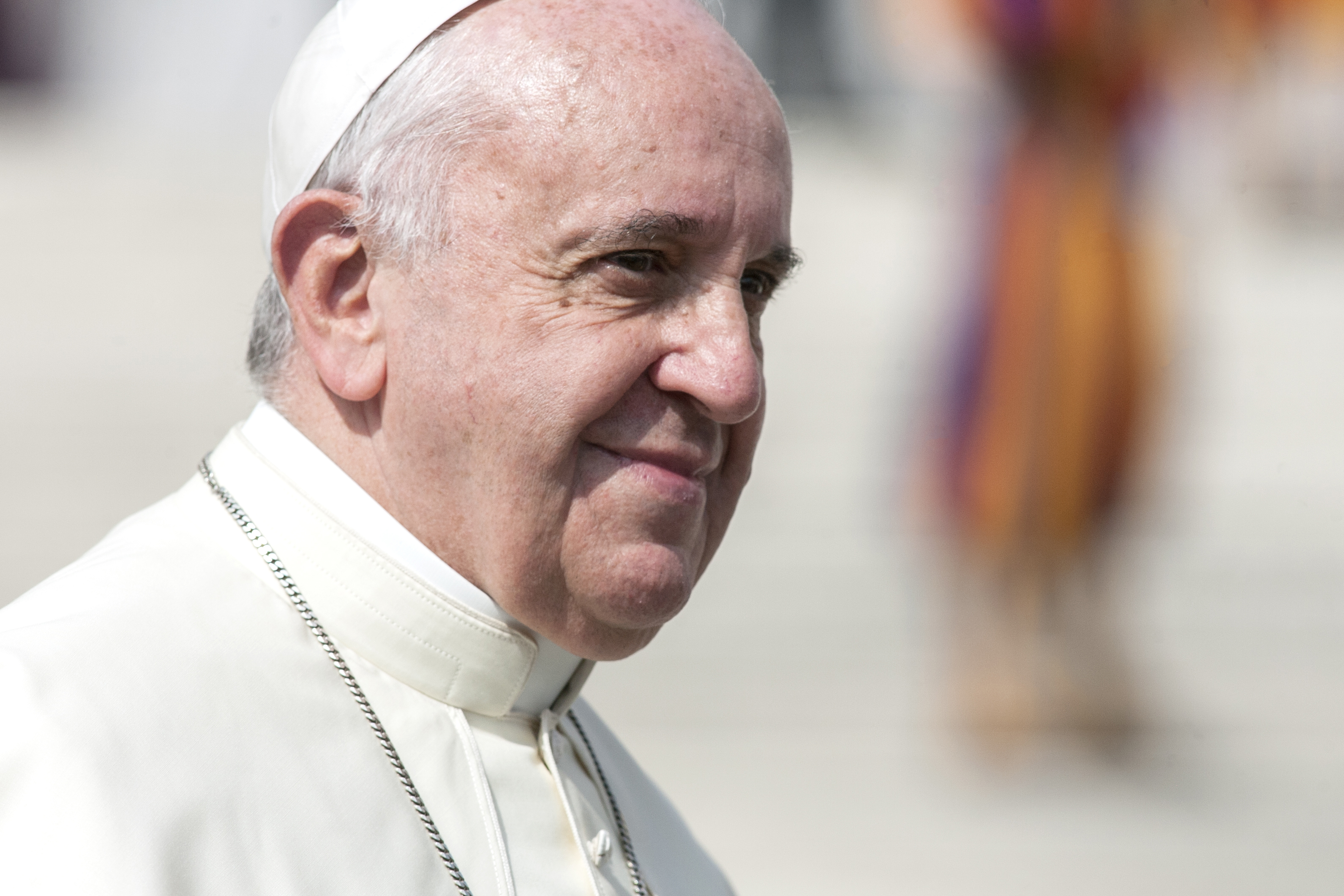Oblate News
MESSAGE OF HIS HOLINESS POPE FRANCIS FOR THE XXVII WORLD DAY OF THE SICK 2019 “You received without payment; give without payment” (Mt 10:8)

Dear Brothers and Sisters,
“You received without payment; give without payment” (Mt 10:8). These are the words spoken by Jesus when sending forth his apostles to spread the Gospel, so that his Kingdom might grow through acts of gratuitous love.
On the XXVII World Day of the Sick, to be solemnly celebrated on 11 February 2019 in Calcutta, India, the Church – as a Mother to all her children, especially the infirm – reminds us that generous gestures like that of the Good Samaritan are the most credible means of evangelization. Caring for the sick requires professionalism, tenderness, straightforward and simple gestures freely given, like a caress that makes others feel loved.
Life is a gift from God. Saint Paul asks: “What do you have that you did not receive?” (1 Cor 4:7). Precisely because it is a gift, human life cannot be reduced to a personal possession or private property, especially in the light of medical and biotechnological advances that could tempt us to manipulate the “tree of life” (cf. Gen 3:24).
Amid today’s culture of waste and indifference, I would point out that “gift” is the category best suited to challenging today’s individualism and social fragmentation, while at the same time promoting new relationships and means of cooperation between peoples and cultures. Dialogue – the premise of gift – creates possibilities for human growth and development capable of breaking through established ways of exercising power in society. “Gift” means more than simply giving presents: it involves the giving of oneself, and not simply a transfer of property or objects. “Gift” differs from gift-giving because it entails the free gift of self and the desire to build a relationship. It is the acknowledgement of others, which is the basis of society. “Gift” is a reflection of God’s love, which culminates in the incarnation of the Son and the outpouring of the Holy Spirit.
Each of us is poor, needy and destitute. When we are born, we require the care of our parents to survive, and at every stage of life we remain in some way dependent on the help of others. We will always be conscious of our limitations, as “creatures”, before other individuals and situations. A frank acknowledgement of this truth keeps us humble and spurs us to practice solidarity as an essential virtue in life.
Such an acknowledgement leads us to act responsibly to promote a good that is both personal and communal. Only if we see ourselves, not as a world apart, but in a fraternal relationship with others, can we develop a social practice of solidarity aimed at the common good. We should not be afraid to regard ourselves as needy or reliant on others, because individually and by our own efforts we cannot overcome our limitations. So we should not fear, then, to acknowledge those limitations, for God himself, in Jesus, has humbly stooped down to us (cf. Phil 2:8) and continues to do so; in our poverty, he comes to our aid and grants us gifts beyond our imagining.
In light of the solemn celebration in India, I would like to recall, with joy and admiration, the figure of Saint Mother Teresa of Calcutta – a model of charity who made visible God’s love for the poor and sick. As I noted at her canonization, “Mother Teresa, in all aspects of her life, was a generous dispenser of divine mercy, making herself available for everyone through her welcome and defence of human life, of those unborn and those abandoned and discarded… She bowed down before those who were spent, left to die on the side of the road, seeing in them their God-given dignity; she made her voice heard before the powers of this world, so that they might recognize their guilt for the crime – the crimes! – of poverty they created. For Mother Teresa, mercy was the ‘salt’ which gave flavour to her work; it was the ‘light’ that shone in the darkness of the many who no longer had tears to shed for their poverty and suffering. Her mission to the urban and existential peripheries remains for us today an eloquent witness to God’s closeness to the poorest of the poor” (Homily, 4 September 2016).
Saint Mother Teresa helps us understand that our only criterion of action must be selfless love for every human being, without distinction of language, culture, ethnicity or religion. Her example continues to guide us by opening up horizons of joy and hope for all those in need of understanding and tender love, and especially for those who suffer.
Generosity inspires and sustains the work of the many volunteers who are so important in health care and who eloquently embody the spirituality of the Good Samaritan. I express my gratitude and offer my encouragement to all those associations of volunteers committed to the transport and assistance of patients, and all those that organize the donation of blood, tissues and organs. One particular area in which your presence expresses the Church’s care and concern is that of advocacy for the rights of the sick, especially those affected by pathologies requiring special assistance. I would also mention the many efforts made to raise awareness and encourage prevention. Your volunteer work in medical facilities and in homes, which ranges from providing health care to offering spiritual support, is of primary importance. Countless persons who are ill, alone, elderly or frail in mind or body benefit from these services. I urge you to continue to be a sign of the Church’s presence in a secularized world. A volunteer is a good friend with whom one can share personal thoughts and emotions; by their patient listening, volunteers make it possible for the sick to pass from being passive recipients of care to being active participants in a relationship that can restore hope and inspire openness to further treatment. Volunteer work passes on values, behaviours and ways of living born of a deep desire to be generous. It is also a means of making health care more humane.
A spirit of generosity ought especially to inspire Catholic healthcare institutions, whether in the more developed or the poorer areas of our world, since they carry out their activity in the light of the Gospel. Catholic facilities are called to give an example of self-giving, generosity and solidarity in response to the mentality of profit at any price, of giving for the sake of getting, and of exploitation over concern for people.
I urge everyone, at every level, to promote the culture of generosity and of gift, which is indispensable for overcoming the culture of profit and waste. Catholic healthcare institutions must not fall into the trap of simply running a business; they must be concerned with personal care more than profit. We know that health is relational, dependent on interaction with others, and requiring trust, friendship and solidarity. It is a treasure that can be enjoyed fully only when it is shared. The joy of generous giving is a barometer of the health of a Christian.
I entrust all of you to Mary, Salus Infirmorum. May she help us to share the gifts we have received in the spirit of dialogue and mutual acceptance, to live as brothers and sisters attentive to each other’s needs, to give from a generous heart, and to learn the joy of selfless service to others. With great affection, I assure you of my closeness in prayer, and to all I cordially impart my Apostolic Blessing.
Vatican City, 25 November 2018
Solemnity of our Lord Jesus Christ, King of the Universe.
Francis
Recent news
Morning Reflection: Friday 14th March 2025

Good morning, Today we bring you a morning reflection on today’s scripture...
Gospel Reflection Sunday 16th March 2025 | 2nd Sunday in Lent

Gospel Reflection Sunday 16th March 2025 | 2nd Sunday in Lent |...
Morning Reflection: Thursday 13th March 2025

Good morning, Today we bring you a morning reflection on today’s scripture...

